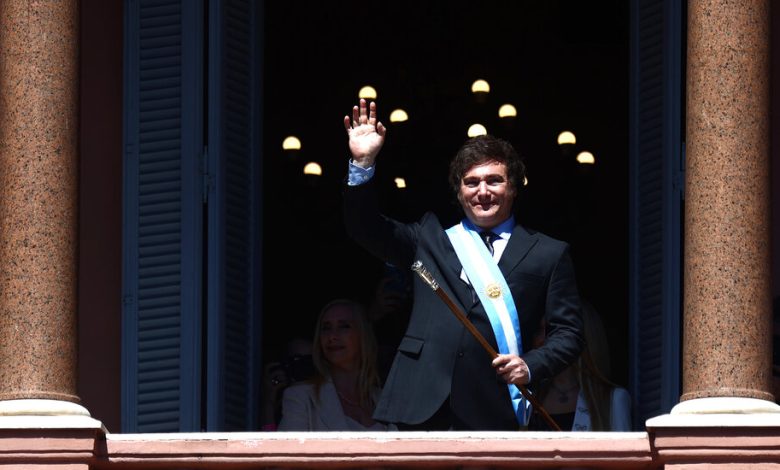Argentina’s New ‘Anarcho-Capitalist’ President Starts Slashing

Javier Milei won Argentina’s presidency last month by wielding a roaring chain saw on the campaign trail to symbolize the slashing he planned for the nation’s government.
On Tuesday, two days after taking office, the self-proclaimed “anarcho-capitalist” unveiled deep spending cuts and a sharp devaluation of Argentina’s currency, carrying the struggling nation of 46 million into a stretch of austerity that he said would bring even more economic pain.
Mr. Milei’s government said it would halt new infrastructure projects; lay off recently hired government workers; reduce energy and transportation subsidies for residents; cut payments to Argentina’s 23 provinces; and halve the number of federal ministries, from 18 to nine.
It said it would also officially devalue the Argentine peso — $1 will now cost 800 pesos, instead of 350 — bringing the government exchange rate much closer to the market value of the peso. The move will likely lead to even sharper price increases in Argentina, which is already suffering under 140 percent inflation.
Mr. Milei and many economists have said that such severe reforms are needed after years of government overspending, but that they would lead to even greater hardship in a nation enduring one of its worst economic crises, including a collapsing currency and rising rates of poverty and hunger.
The package of measures “will increase inflation, will reduce income, will reduce activity and employment and it will increase poverty,” said Martin Rapetti, an economist at the University of Buenos Aires.
“The question is, what is society’s tolerance for these measures?” he added. “The people are the ones who are going to pay.”
Mr. Milei, 53, first became known to Argentines as a conservative economist and television pundit who railed against big government and promoted a strain of libertarianism, which he called anarcho-capitalism, that essentially says society is better without a state at all.
So many Argentines were shocked last month when Mr. Milei, whose presidential campaign was once seen as a sideshow, won the election in a landslide.
His combative style and embrace of conspiracy theories have drawn comparisons to Donald J. Trump, which he has embraced. He has called climate change a socialist plot, for instance, and downplayed the atrocities of Argentina’s bloody military dictatorship of the 1970s and 1980s. But many voters looked past such far-right politics and picked Mr. Milei for his promise of a sharp break with failed economic policies of the past.
He centered his campaign on pledges to eliminate Argentina’s central bank and replace the peso with the U.S. dollar. Yet since winning the election, he has signaled that such an overhaul would have to wait until he could stabilize the economy. That, he has now warned, must happen through deep cuts.
“In the short term, the situation will worsen, but then we’ll see the fruits of our efforts,” he said in his inaugural address on Sunday, to chants of “chain saw” from his supporters. “This is the last rough patch before starting the reconstruction of Argentina,” he added.
On Tuesday, he had his new economy minister, Luis Caputo, deliver the difficult details in an 18-minute prerecorded address. “We will be worse off than now for a few months, especially in terms of inflation,” he said.
Mr. Caputo, a former Wall Street banker, argued that the drastic measures were necessary because Mr. Milei had inherited the “worst situation in history,” adding that Argentina “has always been addicted to deficits.”
The country has been a symbol of economic dysfunction for decades, with bouts of severe inflation, debt defaults, bank runs, currency fluctuations and the political instability that often followed.
Those cascading problems have largely been caused by severe economic mismanagement, by governments on both the left and the right. The latest economic crisis has its roots in the policies of the leftist former president Cristina Fernández de Kirchner, who financed large social programs and economic subsidies partly by draining reserves and simply printing more pesos.
Argentines elected a conservative president, Mauricio Macri, in 2015 to try to reverse such spending, but his bid for major changes failed in the face of massive protests from unions and the poor, who rely on state assistance. Instead, the major legacy of Mr. Macri’s presidency was taking on the biggest loan ever from the International Monetary Fund, eventually amounting to $44 billion, which Argentina is now struggling to pay back.
The I.M.F. cheered Mr. Milei’s moves on Tuesday, saying they “will help stabilize the economy and set the basis for more sustainable and private-sector led growth.”
Alejandro Werner, a former I.M.F. official who helped negotiate Argentina’s loan, said that Mr. Macri had failed by trying to sell austerity measures as painless. Mr. Milei’s government “is not sugarcoating anything,” said Mr. Werner, who has written a book about Argentina’s economic struggles.
He said that the reforms made economic sense but faced major political challenges. Mr. Milei is probably inducing a recession, Mr. Werner said, and that is likely to turn the public and politicians against him.
In an attempt to soften the blow for some, Mr. Milei’s government said that for the nation’s poorest families, support payments would be doubled to $50 a month and food subsidies raised by 50 percent, to as much as $85 a month.
The government says that an average Argentine family’s necessities, including food, transportation and clothing, cost $430 a month. More than 40 percent of Argentine households make less than that, putting them below the poverty line, according to government statistics.
The government left many details vague on Tuesday, such as how many state jobs would be eliminated and how much energy and transportation costs would rise.
The government said it would lay off public workers hired within the last year. It also said it would not start new infrastructure projects and would cancel planned ones that had not yet begun. Argentina employed more than 450,000 people on public infrastructure projects this year.
Subsidies have made energy and transportation very cheap for Argentines. Bus and train fares in Buenos Aires are currently 9 cents, for instance. If the subsidies are eliminated, according to the government, the bus would cost 88 cents and the train $1.38. Those fares would still be considered low in wealthier countries, but under the new government exchange rate, the average Argentine makes only $6,300 a year.




